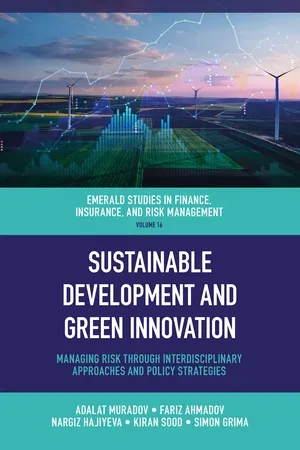
Sustainable Development and Green Innovation
Managing Risk through Interdisciplinary Approaches and Policy Strategies
- English
- ePUB (mobile friendly)
- Available on iOS & Android
Sustainable Development and Green Innovation
Managing Risk through Interdisciplinary Approaches and Policy Strategies
About this book
As the world grapples with pressing issues such as climate change, resource depletion, and biodiversity loss, there is a growing recognition of sustainable development and green innovation's critical role in addressing these complex problems.
This curated collection offers a nuanced understanding of sustainable development and green innovation, emphasising the management of associated risks. The interdisciplinary approach adopted in Sustainable Development and Green Innovation aims to bridge gaps between various fields, fostering a holistic perspective essential for effective problem-solving. By integrating insights from environmental science, policy studies, economics, and technology, the result is a multifaceted framework capable of navigating the intricacies of sustainable development. While there is a plethora of literature on sustainability and innovation, the explicit focus on managing risks through interdisciplinary methods is a unique aspect of this publication. Recognising that sustainable practices and innovations may introduce uncertainties and potential drawbacks, the research delves into strategies for mitigating and adapting to these risks.
In the disruption of political upheaval, new technologies, climate change, and new regulations, it is more important than ever to understand risk in the financial industry. Providing high quality academic research, the ESFIRM series provides a platform for authors to explore, analyse and discuss current and new financial models and theories, and engage with innovative research on an international scale.
Frequently asked questions
- Essential is ideal for learners and professionals who enjoy exploring a wide range of subjects. Access the Essential Library with 800,000+ trusted titles and best-sellers across business, personal growth, and the humanities. Includes unlimited reading time and Standard Read Aloud voice.
- Complete: Perfect for advanced learners and researchers needing full, unrestricted access. Unlock 1.4M+ books across hundreds of subjects, including academic and specialized titles. The Complete Plan also includes advanced features like Premium Read Aloud and Research Assistant.
Please note we cannot support devices running on iOS 13 and Android 7 or earlier. Learn more about using the app.
Information
Table of contents
- Cover Page
- Half Title Page
- Emerald Studies in Finance, Insurance, and Risk Management
- Title Page
- Copyright
- Contents
- About the Editors
- About the Contributors
- Foreword
- Preface
- Chapter 1 Swiss Energy Companies and Energy Transition: Between Strategic Ambitions and Internal and External Constraints
- Chapter 2 Stakeholder Engagement as Policy Instrument for Green Innovation and Development: A Study of Nigeria’s Government Engagement with Educators
- Chapter 3 Green Finance and Sustainable Development: A Bibliometric Review
- Chapter 4 The Role of Technology, AI, ML and DLT in Sustainable Finance and a Green Economy
- Chapter 5 Greening the Future: A Comprehensive Approach to Sustainable Development
- Chapter 6 Imperatives of Social Marketing in the Context of Rural Entrepreneurship
- Chapter 7 Sustainability of Tourism and Regional Airports Based on Good and Less Good Practices
- Chapter 8 Policy Strategies for Sustainable Development and Green Innovation
- Chapter 9 Policy Instruments for Promoting Green Innovation in Economic Development: The Case of Georgia
- Chapter 10 Corruption Perception in the Light of Green Transition Indicators
- Chapter 11 Financial Market Contribution to Sustainable Development: Two Approaches to Green Bonds ETF’s Analysis
- Chapter 12 Green Growth Policy in Visegrad: Key Drivers from an Economic and Non-economic Perspective
- Chapter 13 A Bibliometric Review on the Literature of Green Banking: Using Scopus Database (1997–2022)
- Index